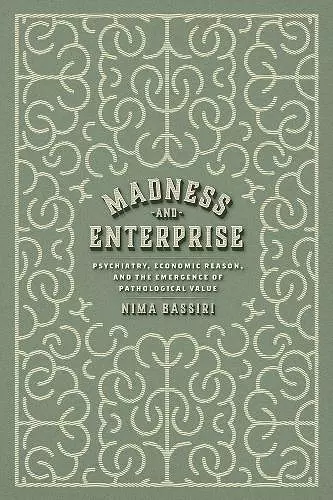Madness and Enterprise
Psychiatry, Economic Reason, and the Emergence of Pathological Value
Format:Paperback
Publisher:The University of Chicago Press
Published:18th Jan '24
Should be back in stock very soon

Uncovers a powerful relationship between pathology and money: beginning in the nineteenth century, the severity of mental illness was measured against a patient’s economic productivity.
Madness and Enterprise reveals the economic norms embedded within psychiatric thinking about mental illness in the North Atlantic world. Over the course of the nineteenth century, various forms of madness were subjected to a style of psychiatric reasoning that was preoccupied with money. Psychiatrists across Western Europe and the United States attributed financial and even moral value to an array of pathological conditions, such that some mental disorders were seen as financial assets and others as economic liabilities. By turning to economic conduct and asking whether potential patients appeared capable of managing their financial affairs or even generating wealth, psychiatrists could often bypass diagnostic uncertainties about a person’s mental state.
Through an exploration of the intertwined histories of psychiatry and economic thought, Nima Bassiri shows how this relationship transformed the very idea of value in the modern North Atlantic, as the most common forms of social valuation—moral value, medical value, and economic value—were rendered equivalent and interchangeable. If what was good and what was healthy were increasingly conflated with what was remunerative (and vice versa), then a conceptual space opened through which madness itself could be converted into an economic form and subsequently redeemed—and even revered.
“Bassiri has made a valuable addition to the study of the human and behavioral sciences, bringing new insights from the critical study of capitalism to his subject. . . . Historians of nineteenth-century psychiatry will be interested in his compelling reading of psychiatric debates. Psychiatrists committed to radical disciplinary reform will be stimulated by the proposals in the conclusion. Moreover, the book’s conceptual and methodological interventions will be relevant broadly to historians of the human and behavioral sciences from the nineteenth century to the present—although Bassiri’s narrative stops in the early twentieth century, we are certainly still living in a world shaped by the economic reason of madness.” * Journal of the History of the Behavioral Sciences *
“In this smart and sophisticated book, Bassiri shows us how an economic style of reasoning came to permeate psychiatry at the turn of the century. Not only were economic and psychiatric metaphors constantly entangled with one another but madness itself became central to economic rationalization. This book offers us a radically new perspective on the history of psychiatry. It also puts forth a fascinating philosophy of psychiatry which places irrationalism at the heart of modern capitalism.” -- Camille Robcis, Columbia University
“For too long, we have accepted a contrast between madness and reason and all the more so between madness and economics. But Bassiri brilliantly demonstrates how our conceptions of madness and moral value are shot through with economic ideas, that in modern societies madness has had a fully economic rationality, that this economic rationality matters for social thought as much as for psychiatric treatments. In a historical epistemology that forces us to reread classics of modern psychology as much as relearn its story through half-forgotten intellectuals, he offers something truly original: a theory of suffering amid capitalist enterprise, and of the ways in which we can imagine a form of care unbound by a century and a half of transactional thinking.” -- Stefanos Geroulanos, New York University
ISBN: 9780226830896
Dimensions: 229mm x 152mm x 23mm
Weight: 454g
352 pages